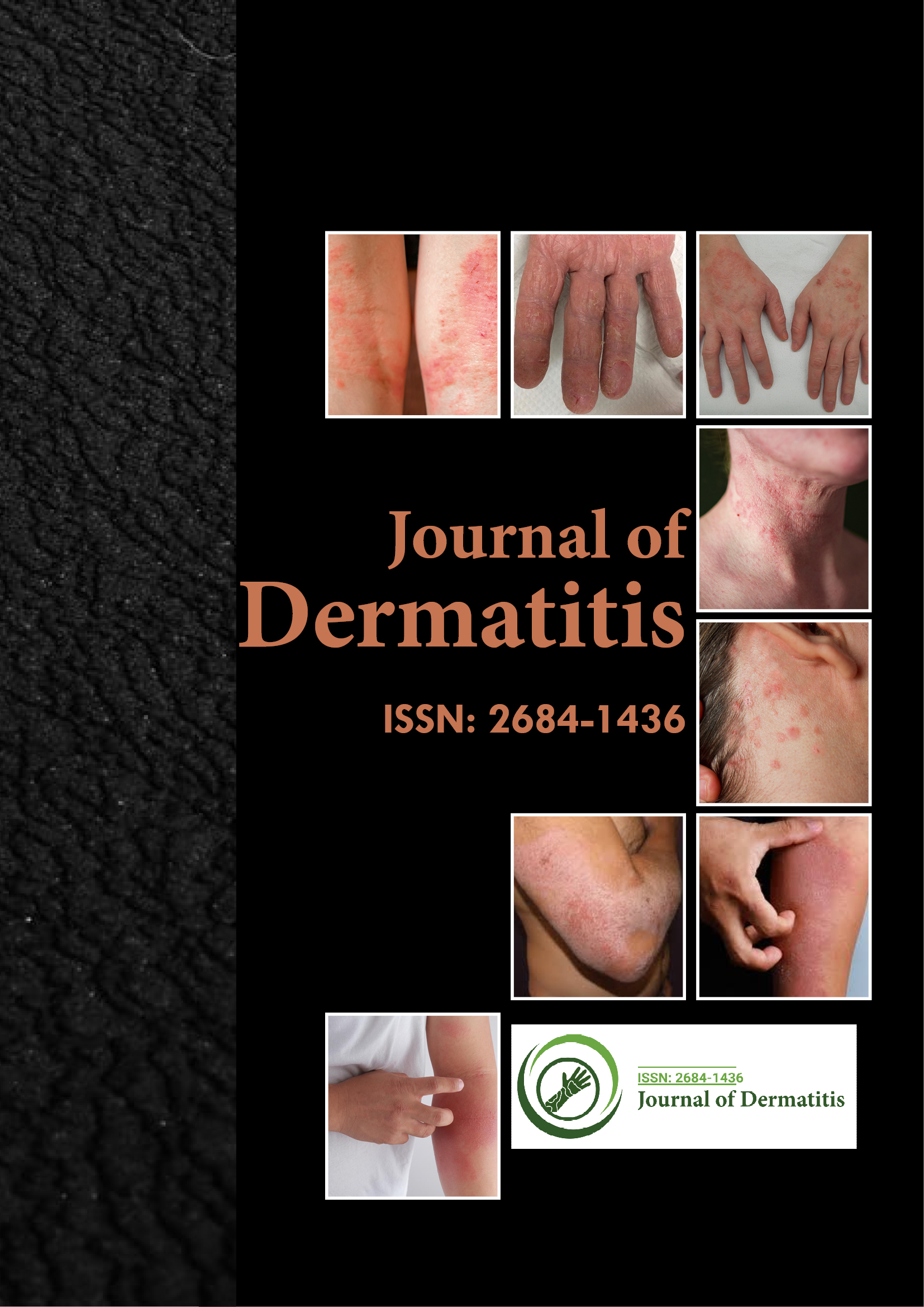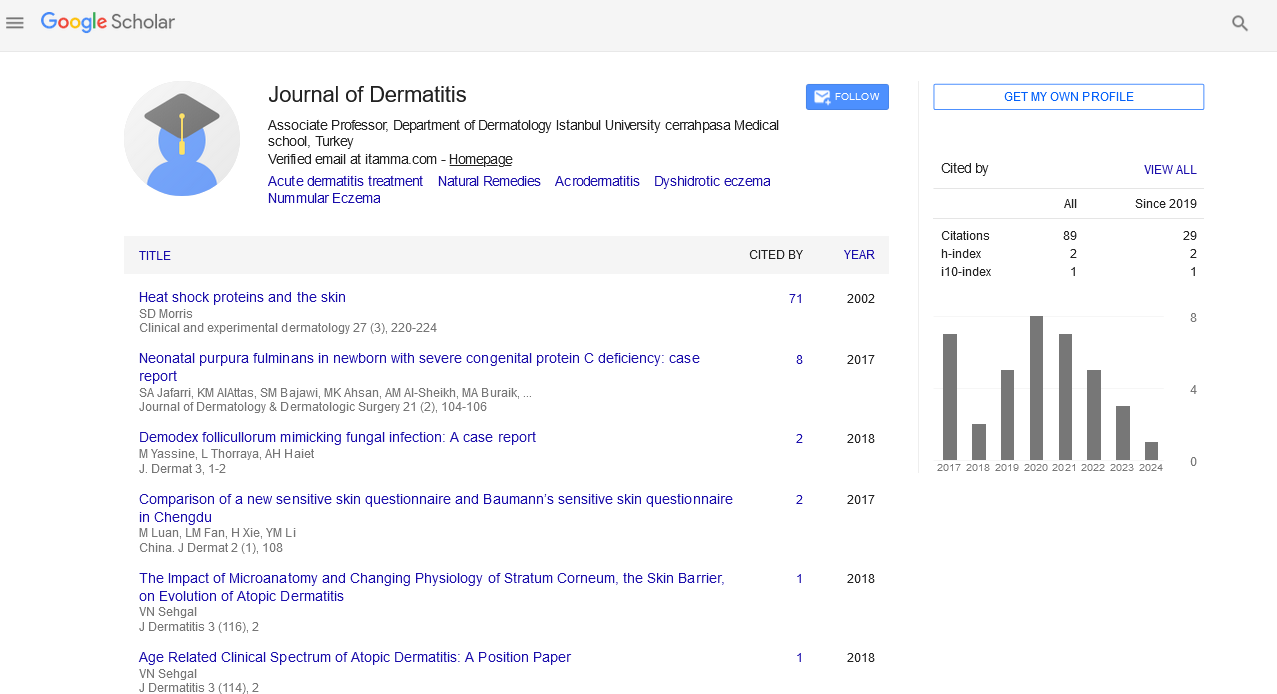Indexed In
- RefSeek
- Hamdard University
- EBSCO A-Z
- Euro Pub
- Google Scholar
Useful Links
Share This Page
Journal Flyer

Open Access Journals
- Agri and Aquaculture
- Biochemistry
- Bioinformatics & Systems Biology
- Business & Management
- Chemistry
- Clinical Sciences
- Engineering
- Food & Nutrition
- General Science
- Genetics & Molecular Biology
- Immunology & Microbiology
- Medical Sciences
- Neuroscience & Psychology
- Nursing & Health Care
- Pharmaceutical Sciences
Perspective - (2023) Volume 8, Issue 4
Understanding and Management of Atopic Dermatitis (Eczema) and Chronic Skin Conditions
Jongmi Huh*Received: 19-Jul-2023, Manuscript No. JOD-23-22368; Editor assigned: 21-Jul-2023, Pre QC No. JOD-23-22368 (PQ); Reviewed: 07-Aug-2023, QC No. JOD-23-22368; Revised: 14-Aug-2023, Manuscript No. JOD-23-22368 (R); Published: 21-Aug-2023, DOI: 10.35248/2684-1436.23.8.205
Description
Atopic Dermatitis is characterized by dry, itchy, and inflamed skin, which often leads to redness, swelling, and the formation of small, fluid-filled bumps. Atopic Dermatitis tends to occur in individuals with a genetic predisposition to allergic conditions, as it is closely associated with other allergic diseases like asthma and hay fever. Although the exact cause of this skin disorder remains unclear, it is caused by a combination of genetic, environmental, and immune system factors.
The symptoms of Atopic Dermatitis can vary in severity, with flare-ups being particularly uncomfortable and distressing for patients. These exacerbations can be triggered by factors such as exposure to irritants like soaps or detergents, extreme temperatures, allergens like pollen or pet dander, stress, and hormonal changes. The condition is most commonly observed in infants and young children, but it can persist into adulthood or even manifest for the first time later in life. In children, Atopic Dermatitis often appears on the face, elbows, knees, and scalp, while in adults, it typically affects the hands, feet, and other skin creases.
Managing Atopic Dermatitis involves a multifaceted approach, and there is currently no cure for the condition. Treatment aims to alleviate symptoms, prevent flare-ups, and maintain the skin's overall health. Moisturizers play a pivotal role in the daily management of eczema as they help to hydrate the skin and form a protective barrier against external irritants. Topical corticosteroids are commonly prescribed to reduce inflammation during flare-ups, but their long-term use may have side effects, so they are often used judiciously. Non-steroidal topical treatments, such as calcineurin inhibitors, are also available for managing eczema in sensitive areas like the face and neck.
Beyond topical treatments, identifying and avoiding triggers are vital in managing Atopic Dermatitis. Keeping a diary to track potential exacerbating factors can be beneficial in this regard. Additionally, lifestyle modifications, such as wearing breathable fabrics, using mild soaps and detergents, and maintaining a consistent bathing routine, can help reduce the frequency and severity of flare-ups.
For severe and persistent cases of Atopic Dermatitis that do not respond to standard treatments, systemic therapies may be considered. These may include oral immunosuppressants, biologic medications, or phototherapy, which uses controlled exposure to ultraviolet light to alleviate symptoms.
The impact of Atopic Dermatitis extends the physical discomfort it causes. Living with a chronic skin condition can take a toll on one's well-being, leading to feelings of frustration, embarrassment, and anxiety. Patients may also experience difficulties with sleep due to intense itching, which can further exacerbate their overall life. Therefore, managing the psychological aspect of Atopic Dermatitis is an addressing the physical symptoms. Counseling and education about the condition can be valuable resources for patients and their families.
In conclusion, Atopic Dermatitis is a prevalent and chronic skin condition characterized by inflamed, itchy skin. While it is not curable, various treatments are available to manage and alleviate symptoms, including topical corticosteroids, moisturizers, and lifestyle modifications. Identifying triggers and taking steps to avoid them can also significantly improve the condition's management. Furthermore, considering the emotional impact of Atopic Dermatitis is essential in providing comprehensive care for affected individuals. Through a combination of medical interventions and supportive measures, those living with Atopic Dermatitis can find ways to lead fulfilling lives despite the challenges by this skin disorder.
Citation: Huh J (2023) Understanding and Management of Atopic Dermatitis (Eczema) and Chronic Skin Conditions. J Dermatitis. 8:205.
Copyright: © 2023 Huh J. This is an open-access article distributed under the terms of the Creative Commons Attribution License, which permits unrestricted use, distribution, and reproduction in any medium, provided the original author and source are credited.

